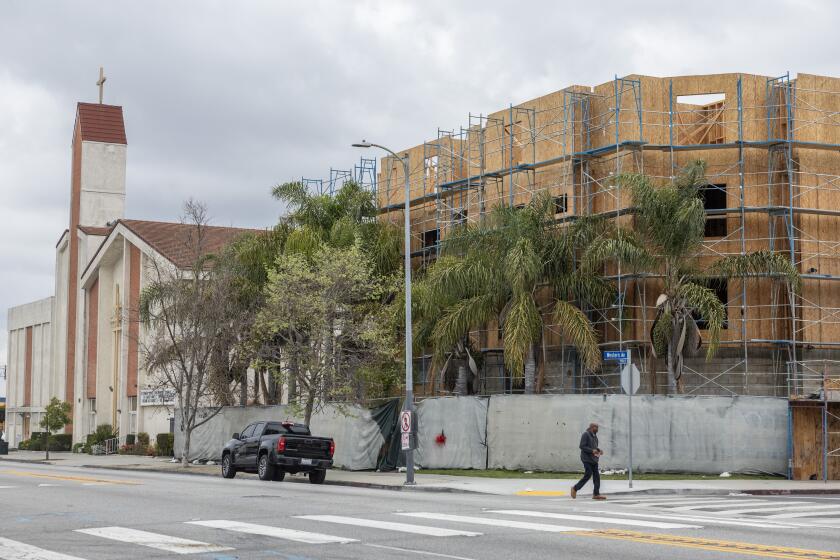Op-Ed: Right by the beach, and the bus depot
The house my wife found in Venice was close to the beach. It was also alarmingly close to Division Six: a 3.5-acre bus depot ringed by tall fencing and barbed wire. On the sidewalk out front, happy people walked by, carrying surfboards or shopping bags. Just as continuously, in and out of the depot, the variously numbered orange city buses lumbered and wheezed.
I wanted the house, yet I did not want the house. And then it didn’t matter, because it was ours.
On a chilly evening in January 2014, with painters and plumbers shooed away, we tried to sleep there for the first time. Our inflatable mattress deflated, the gas heater struggled, and by 5 a.m. — freezing and with my face close to the ground — I was jolted awake by the rumble of an engine, then another, and finally the ear-splitting cacophony of reverse-warning mechanisms chirping from dozens of buses jockeying to get out first.
“This is a nightmare,” my wife said. I couldn’t disagree.
We sat on the front porch at night, gritting our teeth, blinded by the massive spotlights that burned all night, bathing the depot and the buses (and our bedroom and every other inch of our house) in a harsh wash of white.
But this is not a story of defeat. First we installed a sound machine. Not long after, my wife replaced the thin paper shades with heavy-duty curtains. Then we hung up a string of fairy bulbs, giving our deck a softer glow.
We could do it, we realized. If we worked hard enough, we could fashion a livable space near something as unpleasant as a bus lot.
We could do it, we realized. If we worked hard enough, we could fashion a livable space near something as unpleasant as a bus lot.
The seasons came and went, and I grew fonder of our situation, bragging to whomever would listen about how we’d converted hardship into housewarming. Somehow, triumphing over adversity made our house even more of a home.
Eventually I was able to articulate hidden benefits: all that airspace, how cool it was to contemplate our city’s infrastructure, the way those massive lights and the constant presence of a security guard kept our street safe from crime. I explained to our daughter that it was special to share a neighborhood with bus drivers. On a side of town that could feel homogenous — all yoga pants and SUVs — Division Six made us feel part of an authentic and diverse city. You could set your clock by that lady bus driver’s booming laugh, or the mechanic guy’s booming reggaeton. We’d get home and they’d be leaving, and this balance was our lives.
———————
When we came back from vacation in January, something was different. I drifted off to sleep, exhausted from travel, having neglected to turn on the sound machine. And yet — I slept until sunrise. Confused, I wandered outside. All but two of the buses were gone.
The Metro board of directors had voted to cease operations, and sell Division Six. One council member — also a board member at Metro — was trying to steer the conversation toward affordable housing. With a value of roughly $50 million, however, it was difficult to imagine the board doing anything but auctioning off the land to the highest bidder.
I stood on my front porch, staring at the newly empty lot, not quite knowing what to think, gravitating between relief and anxiety.
Although I’d loudly proclaimed the benefits of living next to a bus lot, I knew I wouldn’t miss the noise and the bright white lights. But neither could I bring myself to feel excited about whatever would come next. Something sanitized and shinier, no doubt: A tech megaplex or apartments (affordable or not) to suit a rapidly gentrifying neighborhood.
With essential infrastructure pushed to the other side of town, our already secluded beachside community would feel even more divorced from reality. Goodbye, grit. Goodbye, reggaeton. No longer could we count on the bus lot to invite the collisions between people of different backgrounds that make cities so joyfully surprising.
The line is usually “not in my backyard.” I have this fuzzy image of the very last bus to leave — its engine no longer in operation. A lone worker loads the orange vehicle onto the back of a truck, and then all is quiet.
Nathan Deuel is the author of “Friday Was the Bomb: Five Years in the Middle East.” He teaches undergraduate writing at the University of California, Los Angeles, and graduate writing at Mount Saint Mary’s University.
Follow the Opinion section on Twitter @latimesopinion and Facebook
More to Read
A cure for the common opinion
Get thought-provoking perspectives with our weekly newsletter.
You may occasionally receive promotional content from the Los Angeles Times.










